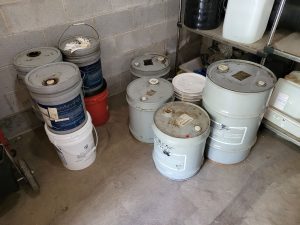Environmental

At UNC Charlotte, processes and practices have been established to help the university operate efficiently while reducing the overall impact to the environment. We provide consultative support for programs related to the FIRFA (Federal Insecticide, Fungicide, and Rodenticide) Program, SPCC (Spill Prevention and Countermeasures Control) Program, UST (Underground Storage Tanks) Program, Dangerous or Hazardous Materials Collection Program, and the EPA 608 Refrigerant Management Program. The EHS office is available to assist with any project that may directly impact the natural or campus environment at UNC Charlotte.
What you need to know
- Pesticides may be applied as liquids, sprays, powders, granules, or gasses. You may come into contact with pesticides inadvertently because pesticides often leave behind a residue on surfaces and equipment.
- It is important to thoroughly wash any skin or clothing that comes into contact with pesticides, and seek medical assistance if rash, redness, swelling or other symptoms occur.
- Hydraulic, Motor, Refrigerant, Transformer, Cooling, Cutting, and Lubricating Oils are all used throughout the UNC Charlotte campus and classrooms.
- Used oils must not be poured down drains or sinks and must be properly collected and recycled or disposed of. EH&S can provide oil collection and disposal services as needed.
- Spills can quickly travel into local waterways, such as Toby Creek and Heck Lake, and must be reported to EH&S immediately to reduce environmental impact.
- Spill Kits are located around campus to assist in containing and cleaning up spilled materials.
- Refrigerant Alarm Systems are in place in every campus mechanical room containing chillers and air condition systems. Should a refrigerant alarm sound, the area should be evacuated promptly and campus police and EH&S notified immediately.
- Refrigerant Storage Areas have been designated on campus for safe refrigerant handling
Services
The Environmental Health and Safety Office offers the following services:
- Pesticide or Herbicide Regulatory Compliance
- Oil Spill Reporting
- Used Oil Collection
- Sewer Overflow Response
- Diesel Generator Inspection
- Fuel and Oil Storage Tanks Assessment
- Spill Kit Evaluation and Location
- Refrigerant Safety Assessment
- Refrigerant Leak Alarm Response